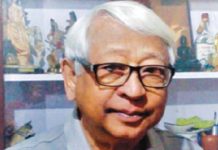Arshad Warsi could have been just another dancer. Aastha Atray Banan tells the story of Bollywood’s newest pin-up

IN AN INDUSTRY that prefers to keep its actors separate from its stars, the rise of Arshad Warsi provides a rare glimmer of hope. But Warsi hasn’t been standing comfortably atop Bollywood’s ladder of success for too long. While his actorly talents have been in no doubt since his debut in the charming prince-and-pauper tale Tere Mere Sapne (1996), it’s taken the decidedly unchocolatey Warsi a long time to become a bankable name at the box office.
From not being able to afford an auto from Juhu to Andheri in 1992 to becoming the nation’s best-beloved goon — Circuit in the Munnabhai films (2003, 2006) — and now the roughhewn, rough-tongued, yet indefinably sexy Babban in Ishqiya, Arshad Warsi’s journey hasn’t been a smooth one. But the 41- year-old Warsi wouldn’t have had it any other way. “My father, originally a musician in Lahore, was a mess at business matters. I came back from boarding school in Deolali at 17 and realised I had to work to get by.”
He went from door to door selling cosmetics and worked in a photo developing lab. “I remember standing on the road, eating a vada pav and thinking, ‘life has to get better than this.’” So when he was offered Rs 1,000 to dance as part of Akbar Sami’s troupe, he grabbed the chance. Dance proved to be the stepping stone he’d been waiting for. In 1991, he won the Indian dance championship. “I got a Yamaha bike as a prize. My life was riding from Juhu to Churchgate every day, choreography, and dancing,” remembers Warsi. He went on to win fourth place in the modern jazz category at the 1992 world dance championships in London. Back in Mumbai, he started a dance studio called Awesome, assisted director Mahesh Bhatt and choreographed shows for Bharat Dabholkar and the title song for Boney Kapoor’s Roop Ki Rani, Choron Ka Raja (1993).
That life could have become routine. But as Warsi says, God had other plans. Joy Augustine, who directed Tere Mere Sapne,met him at a party and urged him to send his pictures to producers ABCL. “I dressed up as a taxi driver and posed next to a taxi. I got a call from Jaya Bachchan’s office, but didn’t want to act because I was scared of failure,” he says. “Jayaji told me later she chose me because in each picture, I had a different expression”. Once he took the role, though, he let it rip. “I gave myself a crash course in acting during that movie. And it worked. I realised I was a natural. I took to acting like a fish to water.” A sleeper hit, Tere Mere put Warsi on the fast-track. Today he regrets signing one movie after another. “I didn’t have a clue how the industry worked. I let my manager decide what films I would do. Somehow, things just went downhill too soon.” He knew he had hit rock-bottom when he started getting calls urging him to return signing amounts. So began the struggle all over again. “Thank God Maria was a popular VJ,” says Arshad of his wife of 10 years. Maria Goretti, a St Andrews College student who fell for Arshad when she joined his dance troupe, kept the household afloat till directors Vidhu Vinod Chopra and Rajkumar Hirani came calling. Though first considered for the role of Munna, he was eventually offered the role of Circuit. “I had watched Arshad in Tere Mere Sapne. I knew he could do this,” says Hirani. But like the other actors who had refused the role, Warsi wasn’t sure he wanted to play sidekick. He was going to reject the offer when a tarot card reader friend advised him to take the role. He relented. And Munnabhai MBBS became an unimaginable hit. “Hrithik sent me flowers, Mr Bachchan called. Everyone loved me. I didn’t know what was happening.”
The sequel, Lage Raho Munnabhai, together with Shashanka Ghosh’s zany Waisa Bhi Hota Hai Part II (2003) and Kabir Kaushik’s critically-acclaimed Sehar (2005), helped establish Warsi as one of the finest actors around. In Sehar, even as he reprised a role done to death in Hindi cinema — the honest police officer in a system rotten to the core — Warsi displayed a quiet intensity. The regrettably under-watched Waisa Bhi gave a glimpse of Warsi’s talent for nuanced black comedy. But the public perception of him remained dominated by Munnabhai and the moneymaking slapstick capers that followed: Golmaal(2006), Dhamaal (2007), Krazzy 4 (2008). “I was getting slotted as a comic actor. I think Ishqiya has changed that perception,” he says, relaxing at his Versova home as he twirls the moustache that makes his Babban, a goon with an overactive sex drive, so drool-worthy.
‘I was scared of failing as an actor. But I Realised I was a natural. I took to acting like a fish to water’
NASEERUDDIN SHAH and Vidya Balan, his co-stars in Abhishek Chaubey’s deep dark desi western, Ishqiya, are full of praise. “He is easily the best all-round actor in this generation. Only a very special kind of actor can be as generously giving towards co-stars,” says Shah. “He is so subtle, yet so effective. He reminds me of the great European actors who can fit into any role. But he is completely under-utilised,” says Balan, who shares a steamy kiss with Warsi in Ishqiya. Chaubey, too, had full faith in Warsi’s method. “Once you explain the character, he just takes it from there. He has no hang-ups, no ego. He’s a mature man.”
Surrounded by his wife and two beautiful children, Warsi looks content, yet aching to climb more mountains. “You haven’t seen the best of Arshad yet,” says Maria, looking over at her husband fondly as he kisses their son goodnight. But despite the accolades, and his first production, Hum, Tum Aur Ghost, releasing in March, Warsi still feels like an outsider in the film fraternity: “I don’t have that greed for success. I’m just making sure my children don’t have to struggle like me.” He understands the neuroses of success, having had to prise it from a reluctant world: he bargains to be on magazine covers, for the way he is shot, to make sure he stays in the black. Someone once said, careers, like rockets, don’t always take off on schedule. The key is to keep working the engines. Arshad Warsi has certainly got that down pat.
WRITER’S EMAIL
aastha@tehelka.com












